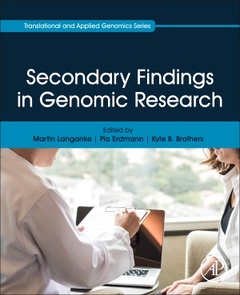Secondary Findings in Genomic Research Translational and Applied Genomics Series

Secondary Findings in Genomic Research offers a single, highly accessible resource on interpreting, managing and disclosing secondary findings in genomic research. With chapters written by experts in the field, this book is the first to concisely explain the ethical and practical issues raised by secondary genomics findings for a multi and interdisciplinary audience of genomic researchers, translational scientists, clinicians, medical students, genetic counselors, ethicists, legal experts and law students, public policy specialists and regulators.
Contributors from Europe, North America, and Asia effectively synthesize perspectives from a spectrum of different scientific, societal, and global contexts, and offer pragmatic approaches to a range of topics, including oversight, governance and policy surrounding secondary genomic results, criteria for identifying results for return, communication and consent, stakeholders? attitudes and perspectives, disclosing results, and clinical, patient-centered protocols.
2. Oversight, governance, and policy for making decisions about return of individual genomic findings
3. Selecting secondary findings to report: Creating a list that suits your study
4. How secondary findings are made
5. Informed consent and decision-making
6. Reporting of secondary findings in genomic research: Stakeholders’ attitudes and preferences
7. Disclosing genomic sequencing results
8. Implications of secondary findings for clinical contexts
9. Secondary findings: Building a bridge to the future of ELSI
Active researchers, basic and translational scientists, clinicians, postgraduates, and students in the areas of genetics, human genomics, pathology and bioinformatics; medical students, pediatricians; internal medicine physicians and residents; genetic counselors, and genetic counseling students; clinical and laboratory genetics trainees (residents and fellows); law students and legal professionals; students and professional in biomedical ethics, research ethics, public policy, and regulatory practice
- Thoroughly addresses the scientific, ethical, practical and clinical issues raised by secondary findings resulting from genomic research, including active debate and challenges in the field
- Provides researchers, clinicians, regulators, and stakeholders with a holistic, interdisciplinary approach to interpreting, managing and disclosing secondary findings
- Brings together expert analysis from scholars across Europe, North America, and Asia representing a wide variety of scientific and societal contexts
Date de parution : 03-2020
Ouvrage de 244 p.
19x23.3 cm
Mots-clés :
Actionability; Additional findings; Analysis; Attitudes; Autonomy; Clinical actionability; Clinical genomics; Clinical sequencing; Data ownership; Data protection; Decision-making; Disclosure of research results; Exome sequencing; Gene validity; Genome sequencing; Genomic sequencing; Health economics; History of debate; Incidental findings; Individual research results; Informed consent; Institutional Review Board (IRB); International perspective; Law; MRI; Pediatric genomics; Policy; Polygenic risk scores; Practicability; Preferences; Pretest genetic counseling; Reanalysis; Research; Research ethics; Research Ethics Committee (REC); Research imaging; Return of results; Right not to know; Right to know; Secondary findings; Secondary genomic findings; Stakeholder; Translation; Wellness genomics



